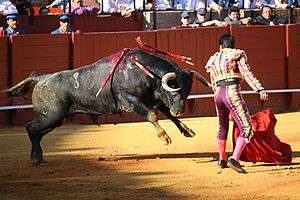Miura bull

A Miura bull is a Spanish fighting bull bred from the lineage of the Miura Cattle Ranch (Spanish: Ganadería Miura), located in the province of Seville, Spain. The ranch is known for producing large and difficult fighting bulls. A Miura bull debuted in Madrid on April 30, 1849.
The Miura line traces its roots to five historic Spanish bull breeds, namely the Gallardo, Cabrera, Navarra, Veragua, and Vistahermosa-Parladé.[1]
The Miura ranch is located at the Zahariche estate, a few miles from the village of Lora del Río, in the province of Seville. The estate, which has been owned by the Miuras since 1842, encompasses over 600 hectares, and several hundred bulls, oxen, cows and calves live on its lands. The stud farm employs twelve people, including eight Andalusian vaqueros. The ranch is presided over by Eduardo and Antonio Miura, sons of the late Eduardo. According to Eduardo Miura, the ranch aims to "breed for quality, not quantity".
The Miura breed was created in 1842 by Juan Miura, using 220 Gil de Herrera cows, and 200 José Luis Alvareda cows and bulls, all coming from the Gallardo family of El Puerto de Santa María. In 1850, the Cabrera line was added using cows from Jerónima Núñez de Prado, and two Vistahermosa bulls were brought in 1860. The bullfighter Rafael Molina Sánchez donated a Navarro bull, and the Duke of Veragua contributed a castaño ojinegro. Also known to have been involved are a bull from Conde de la Corte, and the bull named "Bandillero", a Parladé belonging to the Marquess of Tamarón.
The bulls were fought under the name of Juan Miura until his death in 1854. Then they were under the name of his widow, Josefa Fernandez de Miura. After her death, the livestock bore the name of her eldest son Antonio Miura Fernandez from 1869 to 1893 and then the younger brother, Eduardo Miura Fernandez until his death in 1917.[2]
Reputation
In his book Death in the Afternoon, Ernest Hemingway wrote:
There are certain strains of bull with a marked ability to learn from what goes on in the arena ... faster than the actual fight progresses which makes it more difficult from one minute to the next to control them ... these bulls are raised by Don Eduardo Miura's sons from old fighting stock...
Bulls from the Miura lineage have a reputation for being large, fierce, and cunning.[3] It is said to be especially dangerous for a matador to turn his back on a Miura.[4] Miura bulls have been referred to as individualists, each bull seemingly possessing a strong personal character.[5]
The name Miura is best known outside the world of bullfighting thanks to Ferruccio Lamborghini's sports car maker, Lamborghini, and its classic Miura sports car. A number of Lamborghini cars have been named for Miura bulls and the world of bullfighting in general; it was a visit to the Miura ranch that inspired Ferruccio Lamborghini, a Taurus himself, to make a bull the symbol of his industrial empire.
Famous bulls

- Murciélago survived 24 jabs[6] with the lance from the picador in a fight October 5, 1879 against Rafael "El Lagartijo" Molina Sanchez, at the Coso de los califas bullring in Córdoba, Spain. Murciélago fought with such passion and spirit that the crowd called for his life to be spared, an honor which the matador bestowed. The bull, which came from Joaquin del Val di Navarra's farm, was later presented as a gift to Antonio Miura, Eduardo's brother. The Miuras proceeded to sire him into the Miura line. The Lamborghini Murcielago is named in his honor.
- Reventón, who was raised by Heriberto Rodríguez, killed bullfighter Félix Guzmán in Mexico in 1943. In 2007 Lamborghini released a super limited edition hyper car in his honor - the Lamborghini Reventon.
- Islero gored and killed bullfighter Manolete on August 28, 1947. Islero had poor eyesight and tended to chop with his right horn.[7] He was the 5th bull of the afternoon, and the 2nd for Manolete, at a bullfight in the town of Linares in the province of Jaén, Andalusia, Spain. The bull's manager begged Manolete to finish him off quickly; as the matador reached over the bull's horns, thrusting his sword deep up to its hilt, Islero thrust his right horn, goring Manolete in the groin, severing his femoral artery. The bullfighter was rushed to the hospital, but he died on the operating table later that evening. Lamborghini named their Islero 2+2 grand tourer after the bull.
Notes
- ↑ mundotoro.com Archived 2010-05-26 at the Wayback Machine.
- ↑ http://ganaderiamiura.com/el-origen/
- ↑ "Animals: Pamplona's Encierros". Time. July 11, 1932. Retrieved May 12, 2010.
- ↑ "PLAIN PEOPLE: The Best Is Dead". Time. September 8, 1947. Retrieved May 12, 2010.
- ↑ Villiers-Wardell, p. 117
- ↑ Cossío, Los Toros, tomo3: "El toro bravo II", ISBN 978-84-670-2531-6, Espasa Calpe, 2007, Spanien, p 584.
- ↑ geocities.com
References
Books
- Villiers-Wardell, Janie (1914). Spain of the Spanish (Countries and Peoples Series). The University of California.
- Shubert, Adrian (2001). Death and money in the afternoon: a history of the Spanish bullfight (Illustrated ed.). Oxford University Press US.
- Grühsem, Stephan; Vann, Peter (2006). Lamborghini Today: A Tempo Furioso (Illustrated ed.). MotorBooks/MBI Publishing Company. ISBN 0-7603-2704-1.
Temporary list of references
- Time: Death of Manolete time.com
- History 1842—1879: mundotoro.com
- Recent news: sanfermin.com
- Genealogy: mundotoro.com
- mundotoro.com, Miura bulls grazing at the Zahariche ranch in Andalucia
- mundotoro.com
- geocities.com
- Time: Miura bulls in Pamplona running, etc. time.com
- The National geographic magazine, Volume 99, 1951
- Hemingway's Death in the afternoon: the complete annotations
- santxotxim.com
- sevillatoro.com
37°35′47″N 5°28′41″W / 37.59637°N 5.47804°WCoordinates: 37°35′47″N 5°28′41″W / 37.59637°N 5.47804°W